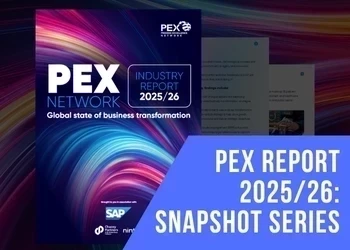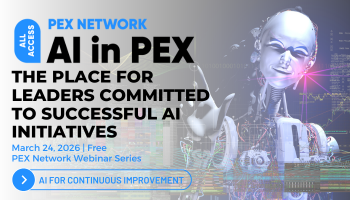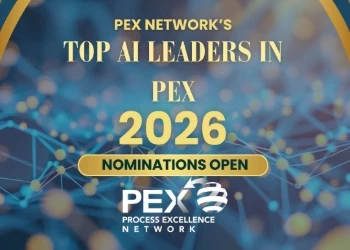Organizations plan AI spending spree to power business transformation
AI agents/agentic AI, generative AI and traditional AI are all on the agenda as businesses look to spearhead transformation
Add bookmark
Organizations are planning significant investment in artificial intelligence (AI) to support business transformation.
The PEX Report 2025/26 found that more than half (59 percent) of surveyed businesses are planning to invest in agentic AI/AI agents in the next 12 months, followed by generative AI (58 percent) and standard/traditional AI (43 percent).
This correlates with separate research from leading analysts. For example, Gartner predicts global end-user spending on generative AI models to total a staggering US$14.2 billion in 2025, while agentic AI investment could reach a mammoth $155 billion by 2030, according to Bank of America analysis.
Join the PEX Network community

Don't miss any news, updates or insider tips from PEX Network by getting them delivered to your inbox. Sign up to our newsletter and join our community of experts.
Learn MoreThe rise of AI spending sprees
Just under a fifth of respondents (18 percent) say their business plans to invest $10,000 to $49,999 in AI in the coming year, with the same number looking to spend less than $10,000.
Furthermore, 16 percent are planning to invest $1 million or more, with 14 percent and 10 percent looking to spend $50,000 to $249,999 and $250,000 to $999,999, respectively. Only 8 percent have no plans to invest in AI in the next year. CEOs are leading AI investment and strategy in more than a third (35 percent) of businesses.
When it comes to investing in new and emerging AI technology, Andreas Welsch, AI expert and author of the AI Leadership Handbook, advised organizations to look for platforms and tools where most of their applications and workloads are.
“While agentic AI is still an emerging area, emphasize interoperability to set yourself up for future growth and workflows that span multiple departments and business applications.”
Doug Shannon, AI and intelligent automation thought leader, echoed similar sentiments. “Agentic AI is a step in the right direction. Companies are rightly drawn to structured systems that enable, empower, and embolden their workforce.”
However, agentic AI is just the starting point. Many organizations are already advancing toward multi-agent systems, which introduce orchestration, automated controls, and guardrails to coordinate activities across the enterprise, Shannon added.
“My advice is to avoid spending big too early without first investing in governance, alignment, and understanding how these systems impact employees and brand trust. AI agents should help drive understanding and confidence across the business. The ultimate goal is autonomy with accountability, where reasoning behind decisions remains clear and traceable, not lost in the system.”
Focusing on high-impact use cases
Organizations should go after focused, high-impact AI use cases; places where agents can deliver real value without huge risks, said Sana Zia Hassan, senior manager – AI at EY.
“It’s also important to set up the right foundations early: think agent orchestration, clear handoff points with humans, and strong monitoring tools so you always know what your AI is doing and why.”
Traditional success metrics like cost savings won’t cut it anymore, you need to look at how agents improve decision-making, adaptability, and speed, Hassan warned
“Don’t forget about your teams: agentic AI doesn’t replace people, it changes how they work. At the end of the day, it’s not just about spending big, it’s about building with purpose, scaling responsibly, and making sure your organization is ready to work alongside AI, not just use it,” Hassan said.
Business transformation budgets
Businesses have differing transformation budgets for the coming year, the PEX Report 2025/26 found. A substantial 40 percent of respondents expect their transformation budget to remain flat over the next 12 months (the same figure as last year), while a quarter (25 percent) expect it to increase (again on par with our previous report).
A similar number (24 percent) are unsure, with only 11 percent predicting their budget to decrease, up from 9 percent last year. More than half of respondents (58 percent) cited cost/budget limitations as the leading business transformation challenge they will encounter in the next 12 months.
All Access: AI in Process Excellence 2026

Don’t get left behind. Join us at All Access: AI in Process Excellence to learn from leading experts, thought leaders, and practitioners who are on the ground experimenting, researching, and learning how to best use AI. They will share their secrets with you for free. And you’ll have the opportunity to network with fellow professionals as we navigate this new world. Register now to save your spot.
Learn More




















